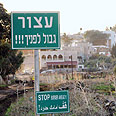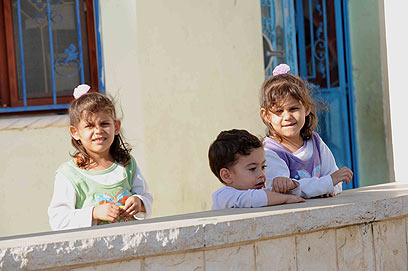
Ghajar fumes over withdrawal plan
Residents of village straddling Lebanon border say Israeli government treating them 'like animals'
Prime Minister Benjamin Netanyahu plans to present Israel's plan to withdraw forces from Ghajar to the United Nations on Monday, news which sparked rage and discontent in the northern village.
The 2,300 residents of the village, which straddles the Israel-Lebanon border, are having difficulty adjusting to images of the new reality to which they will be subjected and expressed rage at the fact that no one has asked them their opinion on the matter.
"Unfortunately, as usual, we are getting updates on what fate has in store for us through the media," Najib Khatib, spokesman for the village council, told Ynet.
"No government source has informed us of such a move, which will directly influence our lives and the fate of our children."
Khatib lamented the atmosphere existing in the village since the IDF's withdrawal from southern Lebanon in 2000. "We live under siege," he said.
"During the Second Lebanon War we absorbed heavy property damage, and despite the fact that we are Israeli citizens and pay taxes to the state, there are residents who have not received compensation for the damages caused by the war until this very day, in contrast to other residents of northern Israel."

Entrance to Ghajar (Photo: Avihu Shapira)
Council Chairman Ahmed Fatli met with members of the Knesset Foreign Affairs and Defense Committee recently and enlightened them on the difficulties faced by residents of the village. He relayed fears that Ghajar would come under the authority of the UN force in Lebanon, UNIFIL, fears that will be realized if Netanyahu's plan is green-lighted.
"We will not separate between family members," Khatib insisted. "The Berlin Wall fell, but now they want to establish a new wall here. Our fate must remain linked to that of the Golan Heights, since we were conquered together with it from Syria, and some of the older residents still hold bills of land ownership issued in Syria."
Schoolchildren to undergo security checks?
As the afternoon wore on, students could be seen making their way to homes in the northern part of the village from the school in the south. Just hours after receiving news of the plan, residents were appalled and fearful.
"This decision will force children to undergo a security check at a UNIFIL checkpoint to go to school and then back home," said Yussef, a resident of Ghajar. "Everything is in the southern part – the council, cemetery, soccer field, and supermarket. How can you expect people to undergo so many humiliating checks?"
Ghajar's northern side was built according to a government permit issued in 1978. But after Israel's withdrawal from Lebanon in the year 2000, it came to be recognized as under Lebanese sovereignty, a decision enforced by UN Resolution 1701, which ended the Second Lebanon War.

'We deserve fair treatment' (Photo: Avihu Shapira)
Even now, the residents have difficulty running normal lives. "The refrigerator repairman asked me to load the fridge onto my car and come to the entrance of the village. Baby products are brought to the village entrance, and service-providers from the phone, cable, and electric companies don't enter the northern part and can only enter the southern part with a special permit," said Bilal Khatib, a resident of the northern side of Ghajar.
He added that the village residents were united in their disapproval of the new plan. "Live and let live," he said. "We are people but being treated like animals. Just like the other citizens of Israel, we deserve fair treatment different from that which we have been receiving these past few years."
But despite the backlash, Brigadier-General (Res) Kobi Marom, who has previously served as an important figure in the IDF Northern Command and who knows the area well, promises the government will not leave Ghajar residents to flounder.
"The agreement forming on Ghajar is based on two important principles: Preventing the entrance of Hezbollah operatives to the northern part by two UN squadrons patrolling the area, which is small, and the acceptance of responsibility for the civil and humanitarian situation of the residents by the State of Israel. The agreement will also make the lives of the northern residents easier," Marom said.
- Follow Ynetnews on Facebook










